
Paul Laurence Dunbar was an American poet, novelist, and short story writer of the late 19th and early 20th centuries. Born in Dayton, Ohio, to parents who had been enslaved in Kentucky before the American Civil War, Dunbar began writing stories and verse when he was a child. He published his first poems at the age of 16 in a Dayton newspaper, and served as president of his high school's literary society.

Highland Beach is a town in Anne Arundel County, Maryland, United States. The population was 96 at the 2010 census. The town was founded late in the 19th century by affluent African Americans from Washington, D.C. and Baltimore, looking for a summer retreat on the Chesapeake Bay. The town's incorporated status gave it a unique standing in empowering it to maintain its own police force. Celebrities with homes there have included historian and author Alex Haley, actor and comedian Bill Cosby, and tennis champion Arthur Ashe. Street names in the town include Crummell, Dunbar, Henson, Augusta, Douglass, Langston, and Washington, which were chosen to honor notable African Americans of the time.

Robert Laurence Binyon, CH was an English poet, dramatist and art scholar. Born in Lancaster, England, his parents were Frederick Binyon, a clergyman, and Mary Dockray. He studied at St Paul's School, London and at Trinity College, Oxford, where he won the Newdigate Prize for poetry in 1891. He worked for the British Museum from 1893 until his retirement in 1933. In 1904 he married the historian Cicely Margaret Powell, with whom he had three daughters, including the artist Nicolete Gray.

Dawn is the time that marks the beginning of twilight before sunrise. It is recognized by the appearance of indirect sunlight being scattered in Earth's atmosphere, when the centre of the Sun's disc has reached 18° below the observer's horizon. This morning twilight period will last until sunrise, when direct sunlight outshines the diffused light.

Dayton Aviation Heritage National Historical Park is a United States National Historical Park in Dayton, Ohio that commemorates three important historical figures—Wilbur Wright, Orville Wright, and poet Paul Laurence Dunbar—and their work in the Miami Valley.

Dunbar Gifted & Talented Education International Studies Magnet Middle School is a magnet middle school for students in grades 6 through 8 located in Little Rock, Arkansas, United States. Dunbar Magnet Middle School is administered by the Little Rock School District. It is named for the nationally known African-American poet, Paul Laurence Dunbar.
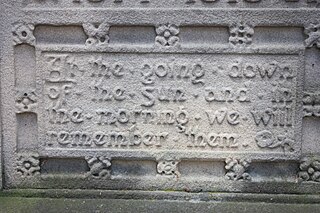
"For the Fallen" is a poem written by Laurence Binyon. It was first published in The Times in September 1914.

Afro-American Symphony, also known as Symphony No. 1"Afro-American" and Symphony No.1 in A flat major, is a 1930 composition by William Grant Still, the first symphony written by an African American and performed for a United States audience by a leading orchestra. It was premiered in 1931 by the Rochester Philharmonic Orchestra. It is a symphonic piece for full orchestra, including celeste, harp, and tenor banjo. It combines a fairly traditional symphonic form with blues progressions and rhythms that were characteristic of popular African-American music at the time. This combination expressed Still's integration of black culture into the classical forms. Still used quotes from four poems by early 20th-century African-American poet Paul Laurence Dunbar as epigraphs for each symphonic movement. The symphony is about twenty-four minutes long.
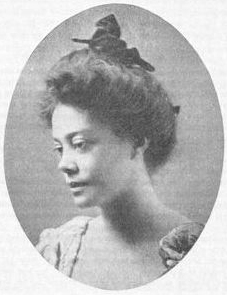
Alice Dunbar Nelson was an American poet, journalist, and political activist. Among the first generation born free in the South after the Civil War, she was one of the prominent African Americans involved in the artistic flourishing of the Harlem Renaissance. Her first husband was the poet Paul Laurence Dunbar. After his death, she married physician Henry A. Callis; and, lastly, was married to Robert J. Nelson, a poet and civil rights activist. She achieved prominence as a poet, author of short stories and dramas, newspaper columnist, activist for women's rights, and editor of two anthologies.

The Paul Laurence Dunbar House was the 1904-1906 home of poet Paul Laurence Dunbar in Dayton, Ohio. It is a historic house museum owned by the state of Ohio and operated by Dayton History on behalf of the Ohio Historical Society; it is also part of Dayton Aviation Heritage National Historical Park. It is located at 219 Paul Laurence Dunbar Street in Dayton.
Ode on the Departing Year was composed by Samuel Taylor Coleridge in 1796. The poem describes Coleridge's feelings on politics and religion, and it emphasises an idyllic lifestyle as an optimal way of living.
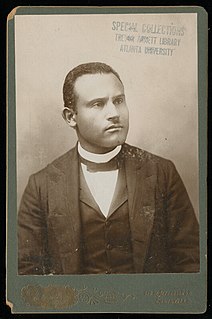
Joseph Seamon Cotter Sr. was a poet, writer, playwright, and community leader raised in Louisville, Kentucky. Cotter was one of the earliest African-American playwrights to be published. He was known as "Kentucky's first Negro poet with real creative ability." Cotter was born at the start of the American Civil War, and was raised in poverty with no formal education until the age of 22. He later became an educator and an advocate of black education.
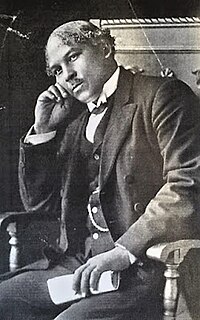
James David Corrothers (1869–1917) was an African-American poet, journalist, and minister whom editor T. Thomas Fortune called "the coming poet of the race." When he died, W. E. B. Du Bois eulogized him as "a serious loss to the race and to literature."
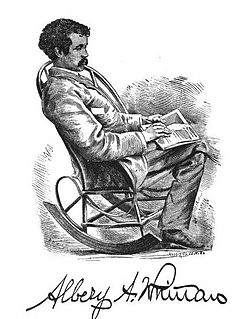
Albery Allson Whitman was an African-American poet, minister and orator. Born into slavery, Whitman created a successful career for himself as a writer, and during his lifetime was acclaimed as the "Poet Laureate of the Negro Race". Throughout his lifetime he worked as a manual laborer, school teacher, financial agent, fundraiser and pastor. He died in Atlanta in 1901 of pneumonia.
Henrietta Cordelia Ray was an African-American poet and teacher, most commonly known as Cordelia Ray. She was the sister of Charlotte E. Ray.
The Negro Problem is a collection of seven essays by prominent Black American writers, such as W. E. B. Du Bois and Paul Laurence Dunbar, edited by Booker T. Washington, and published in 1903. It covers law, education, disenfranchisement, and Black Americans' place in American society.

The Banjo Lesson is an 1893 oil painting by African-American artist Henry Ossawa Tanner. The painting has elements of American Realism and of French Impressionism. It depicts two African-Americans in a humble domestic setting: an old black man is teaching a young boy – possibly his grandson – to play the banjo. It has been held by Hampton University since 1894.
Addison Gayle, Jr. was an American professor, literary critic, and author in New York City. He advocated for a Black aesthetic.

"Sympathy" is an 1899 poem written by Paul Laurence Dunbar. Dunbar, one of the most prominent African-American writers of his time, wrote the poem around while he was working in unpleasant conditions at the Library of Congress. The poem is often considered to be about the struggle of African-Americans. Maya Angelou titled her autobiography I Know Why the Caged Bird Sings from a line in the poem.
"We Wear the Mask" is an 1895 poem by Paul Laurence Dunbar. It is generally considered one of his most famous works and has been cited by several scholars as his best poem.














